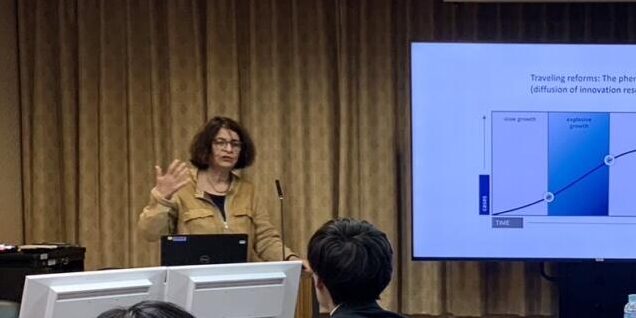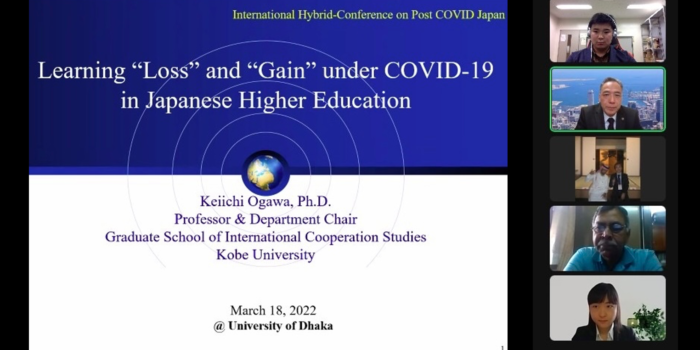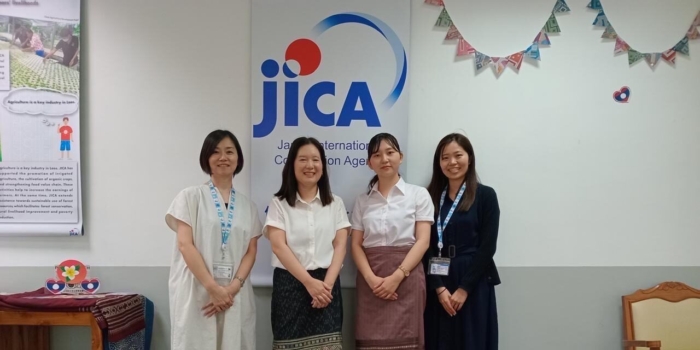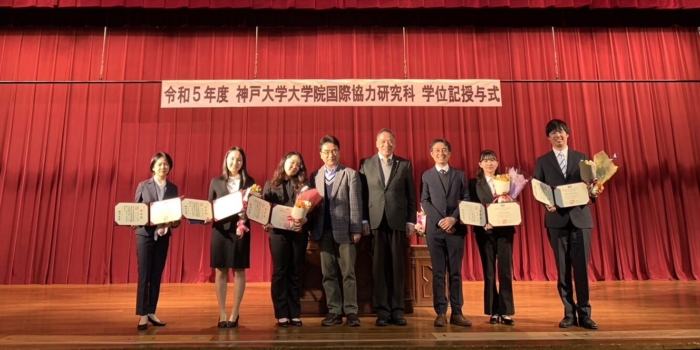On April 18th, 2024, Dr. Gita Steiner-Khamsi, the (designated) William Heard Kilpatrick Professor of Comparative Education at Teachers College, Columbia University, New York, delivered a seminar as the 173rd JASID Kansai Seminar titled “Making Externally Funded Reforms Stick: Challenges and Approaches of International Cooperation Agencies”. Her presentation was conducted at the Main Conference Room, Graduate School of International Cooperation Studies, Kobe University, and via Zoom. Noticeably, there were 157 participants in total joining the seminar: 105 participants joining from Zoom and 52 participants in person.
 Firstly, Professor Steiner-Khamsi discussed the temporal dimension of reforms by providing the example of the global reform wave School-Autonomy-with Accountability (SAWA), in which she differentiated between the time, timing, tempo, sequence, lifespan, and age of policies. For instance, she raised three main examples to explain the lifespan challenges including per capita financing, decentralization/school-based management, and school boards (demand-side accountability). In addition to that, Professor Steiner-Khamsi discussed the temporal dimension of reform as important in the context of international cooperation because a great number of studies show that reform dries up the very moment international funding ends. On top of that, she pointed out three key recontextualization and repurposing School-Autonomy-with Accountability (SAWA) policies, which include quality improvement, school autonomy, and accountability. By way of illustration, she indicated ways to improve the quality and school autonomy by focusing on the professionalization of school management, school development plans and profiles, school boards, per capita financing, incentives for non-state providers, and free school choice, while she explained further on strengthening accountability by concentrating on upgrading performance-based pay, professional external evacuation, remedial measures for failing schools, publicized result, standardized tests, and national curriculum.
Firstly, Professor Steiner-Khamsi discussed the temporal dimension of reforms by providing the example of the global reform wave School-Autonomy-with Accountability (SAWA), in which she differentiated between the time, timing, tempo, sequence, lifespan, and age of policies. For instance, she raised three main examples to explain the lifespan challenges including per capita financing, decentralization/school-based management, and school boards (demand-side accountability). In addition to that, Professor Steiner-Khamsi discussed the temporal dimension of reform as important in the context of international cooperation because a great number of studies show that reform dries up the very moment international funding ends. On top of that, she pointed out three key recontextualization and repurposing School-Autonomy-with Accountability (SAWA) policies, which include quality improvement, school autonomy, and accountability. By way of illustration, she indicated ways to improve the quality and school autonomy by focusing on the professionalization of school management, school development plans and profiles, school boards, per capita financing, incentives for non-state providers, and free school choice, while she explained further on strengthening accountability by concentrating on upgrading performance-based pay, professional external evacuation, remedial measures for failing schools, publicized result, standardized tests, and national curriculum.
Secondly, Professor Steiner-Khamsi demonstrated a few strategic approaches that international cooperation agencies strived to make their funded reform programs sustained beyond the project duration by exploring, in particular, result-based financing modalities from the World Bank and Foreign, Commonwealth and Development Office (FCDO), system transformation approaches from Global Partnership for Education, and the differentiation between project and policy components of a sector development program. To illustrate, she discussed how to improve institutionalization by improving aid effectiveness signed by all cooperation agencies and the government. Conversely, Professor Steiner-Khamsi explained a few reasons for the lack of policy capacity including the delegation of expertise to external advisors such as managers versus policy analysts/advisors within government, rapid political and administrative turnover, and frequent direction of donor support towards strengthening Educational Management Information System (EMIS) and strategic/planning units within the ministries. In particular, she exemplified the system transformation by paying attention to global partnerships for education and examples of curriculum reform including 21st-century framework, education standards, per grade and subject, new textbooks, new manuals for teachers, new teacher education, and new teacher assessment.
Finally, Professor Steiner-Khamsi discussed the question “Do international cooperation agencies learn from past experiences and how do they remedy wrong funding decisions?” In this regard, she raised both positive examples and negative examples about the institutionalization of reforms based on empirical research and evaluation (notably Randomized Controlled Trials (RCTs)) within the World Bank. Likewise, she showed that the positive examples of institutionalization of reforms include eliminating tuition fees in primary and lower secondary schools, discontinuing finance for infrastructure, and focusing on pro-poor policy support such as discontinuing higher education support. Alternatively, for the negative examples as the barriers to lessons learned that are counterproductive to the institutionalization of reforms, she gave examples of a few pilot schools and pilot districts with the unrealistic expectation that the government will scale up the innovation after external funding ended; the projects are too expensive to scale, managerial success criterion: focus on disbursement rate, broken feedback loop from recipient countries, parallel project implementation units, and short duration of partnership/projects.
After the presentation, Professor Keiichi Ogawa from Kobe University facilitated the discussion sessions receiving several questions from the participants, and Professor Steiner-Khamsi critically and practically explained and answered the questions very well, along with sharing her own experience working with international agencies in various countries with diverse people. Through this seminar, we were able to understand the global reform wave School-Autonomy-with Accountability (SAWA) to improve school quality, school autonomy, and accountability, and understand the utmost important temporal dimension of reform in the context of international cooperation. Furthermore, we were able to learn about the positive and negative examples of the institutionalization of reforms.

Authored by Sreymech Hoeun (Master Student)
Related








